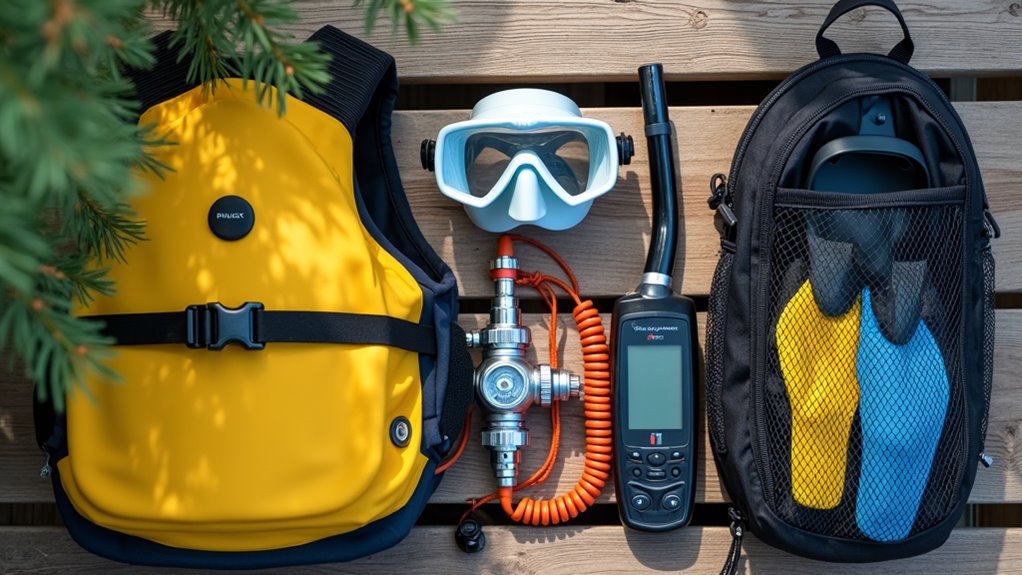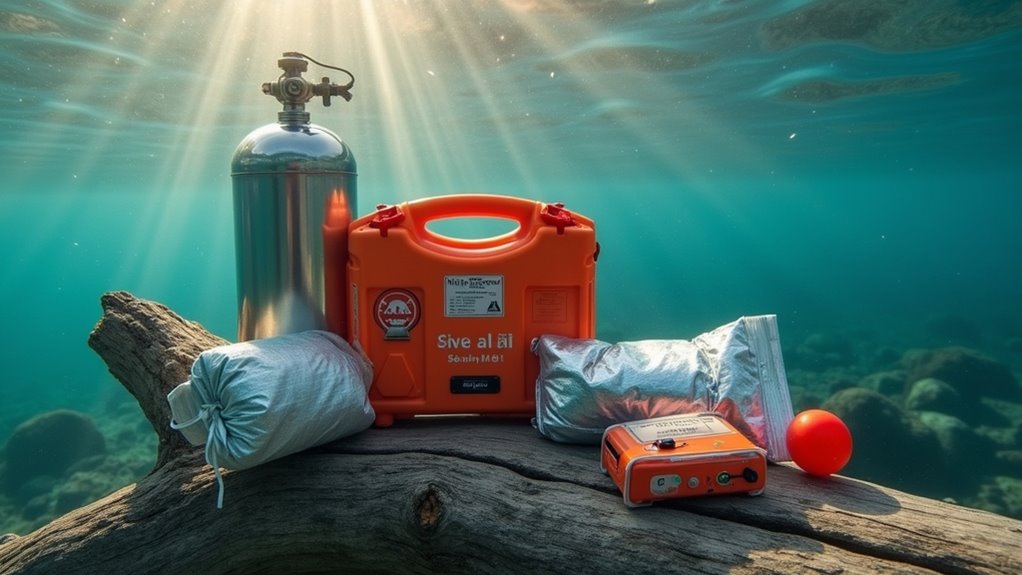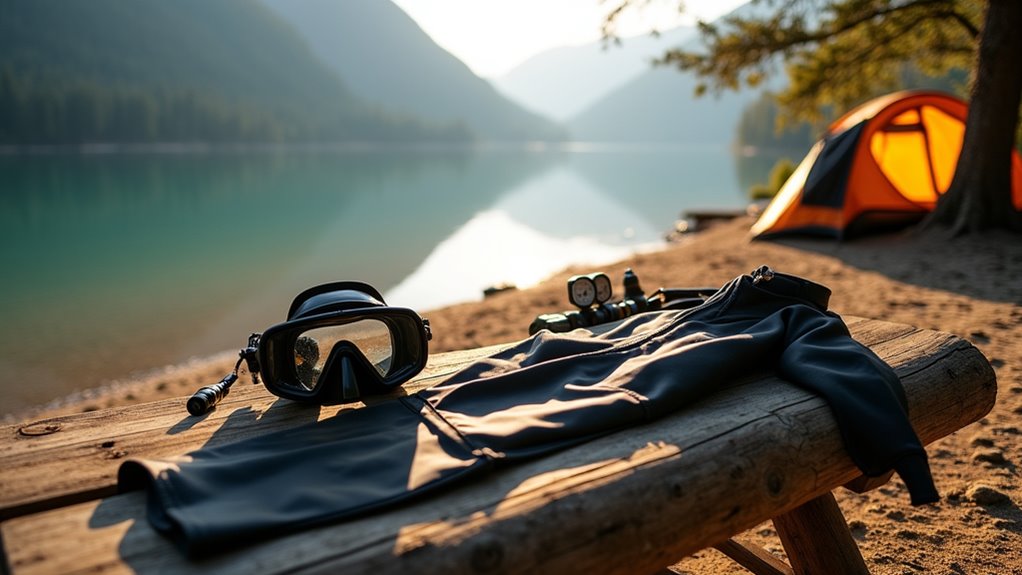Physical Address
304 North Cardinal St.
Dorchester Center, MA 02124
Physical Address
304 North Cardinal St.
Dorchester Center, MA 02124

Before your camping scuba adventure turns deadly, discover which essential safety equipment failures could leave you stranded underwater miles from help.
You’re about to combine two of the most equipment-dependent activities on the planet—camping and scuba diving. While your tent stakes won’t kill you if they fail, faulty dive gear absolutely can. The remote locations that make camping magical also mean you’re hours from help when something goes wrong underwater. Getting your safety equipment right isn’t just about following a checklist; it’s about understanding which gear failures could turn your adventure into a nightmare.

When you’re combining the adventure of camping with scuba diving, your safety equipment becomes your lifeline in remote locations where help isn’t readily available. Pack a thorough first aid kit with marine-specific supplies including seasickness medication, waterproof bandages, and antiseptic solutions.
Bring multiple surface marker buoys and underwater signaling devices like whistles and mirrors. Don’t forget backup masks, regulators, and depth gauges since equipment failure far from dive shops creates serious risks. Include emergency oxygen if you’re trained to use it.
Pack waterproof communication devices like marine radios or satellite communicators for emergency contact. Your dive computer should have backup battery power, and you’ll need dive tables as analog backup. These essentials ensure you’re prepared when professional rescue services aren’t minutes away. Just like planning any memorable camping experience, organizing your dive safety gear in advance helps ensure nothing critical gets left behind.
Beyond the basic safety gear, your communication devices serve as your primary connection to the outside world when you’re diving in remote camping locations. You’ll need a waterproof VHF marine radio for surface communication with your dive buddy and shore support.
Communication devices become your lifeline to the outside world when diving in remote wilderness locations far from civilization.
Pack a satellite communicator or personal locator beacon (PLB) that works anywhere on the planet – these can send distress signals even when cell towers aren’t available.
Don’t forget underwater communication tools like slate boards or underwater writing tablets for silent communication during dives. A dive whistle attached to your BCD provides loud surface signaling.
Consider a waterproof cell phone case as backup, though signal coverage remains unreliable in wilderness areas. Test all devices before departing and carry extra batteries for extended camping trips.
If you’re planning water-based activities beyond diving, research whether renting or buying a boat might enhance your remote camping experience and provide additional safety options.

Since underwater emergencies can escalate quickly in remote locations, you’ll need exhaustive medical supplies that address diving-specific injuries and common wilderness accidents.
Pack waterproof bandages, antiseptic wipes, and gauze for cuts from coral or rocks. Include decongestants and ear drops for pressure-related issues, plus pain relievers like ibuprofen for headaches or joint discomfort.
You’ll want epinephrine auto-injectors if anyone has severe allergies, and consider bringing oral rehydration salts for dehydration. Don’t forget a thermometer, instant cold packs, and elastic bandages for sprains. Include tweezers for removing sea urchin spines or splinters.
Store everything in a completely waterproof case that’s easily accessible from your campsite. Consider taking a wilderness first aid course before your trip to maximize your preparation effectiveness. If you’re planning to explore nearby rainforest hiking trails during your camping trip, these same medical supplies will prove invaluable for treating cuts from dense vegetation, insect bites, and trail-related injuries.
While you’re diving in remote camping locations far from dive shops and emergency services, equipment failures can turn dangerous quickly without proper backup systems. You’ll need redundant gear for every critical component.
Pack a backup regulator system with your own first and second stages. Bring extra masks—at least two spares since a broken strap or cracked lens leaves you helpless underwater. Carry backup dive computers or depth gauges, as relying on a single unit risks decompression miscalculations.
Don’t forget spare fins, snorkels, and weight belts. Pack extra O-rings, batteries, and basic repair tools. Consider a backup air source like a pony bottle for emergencies.
Your redundancy planning should assume you can’t replace anything mid-trip, so overpack rather than risk getting stranded with broken gear. Avoiding these common diving mistakes helps ensure your equipment redundancy planning addresses the most critical failure points that could compromise your safety.

Before you enter the water at your remote camping site, thorough equipment checks become your lifeline since help isn’t around the corner. Start with your regulator system—breathe from both primary and backup regulators, checking for smooth airflow and proper pressure readings.
Test your BCD by inflating and deflating it completely, listening for air leaks. Verify your depth gauge, compass, and computer are functioning correctly. Check mask seals by placing it on your face without straps and inhaling gently through your nose.
Examine all hoses for cracks or wear, and ensure tank valves open fully. Test your wetsuit zippers and inspect fins for damage. These systematic checks take minutes but prevent potentially dangerous equipment failures underwater.
Having reliable camping supplies organized and accessible at your dive site ensures you can address equipment issues or emergencies efficiently when you’re far from dive shops or emergency services.
You’ve got everything you need to dive safely during your camping adventure. Like a well-oiled machine, your equipment checklist guarantees nothing’s left to chance. Remember, redundancy isn’t overkill—it’s your lifeline when you’re miles from civilization. Don’t skip those pre-dive checks, keep your communication devices charged, and trust your gear. With proper preparation, you’ll transform potential risks into manageable situations, letting you focus on what matters most: enjoying those incredible underwater moments.